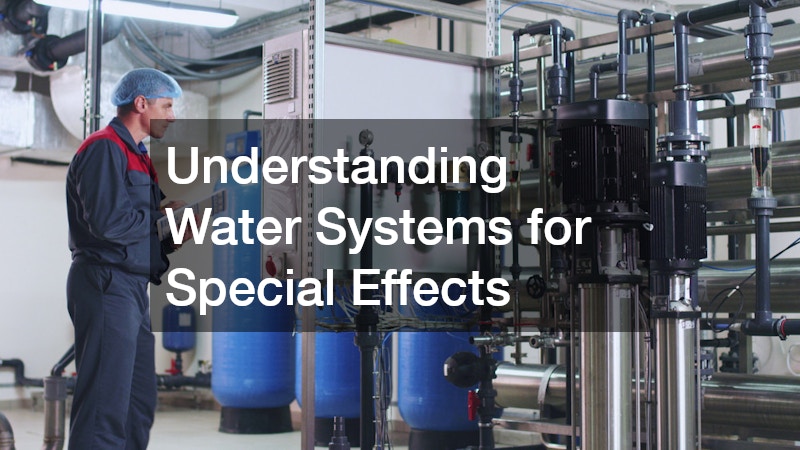Disclaimer: Entertainment News Today. This site provides arts and entertainment content for informational purposes only.
Working for an entertainment production organization often means wearing more hats than you ever thought possible. Beyond the lights, cameras, and creative chaos, there lies a complex network of logistics, equipment, people management, compliance, and unexpected subjects that surface during every stage of a project. Whether you’re coordinating live performances, film shoots, or touring shows, you’ll likely develop knowledge in areas far outside traditional production scopes.
It’s not uncommon for entertainment productino organization employees to gain unexpected fluency in specialized topics. For instance, they may become familiar with boiler water treatment when handling venue operations, or understand the average cost for surrogacy if managing the personal concerns of cast or crew. With every new production, there’s a new problem to solve—and that means expanding your base of knowledge in ways you never predicted.
In this blog, we’ll explore 12 seemingly unrelated areas that entertainment professionals often become surprisingly savvy in. From supply chains to science, real estate to recovery, here’s what you might find yourself learning (or even mastering) when working with a production organization. These experiences make you more than just a production professional—they turn you into a resourceful, well-rounded problem solver.
1. Transportation Equipment

One of the first unexpected lessons you may learn while working for an entertainment production organization is just how critical transportation logistics are—especially when dealing with large, heavy, or oddly shaped equipment. Whether you’re hauling lighting rigs, mobile stages, or backline gear, the mode of transportation must be tailored to the production’s specific needs. This is where specialized equipment like steel truck beds comes into play.
Steel truck beds offer the durability, space, and customization options that entertainment professionals rely on. Unlike standard cargo spaces, these heavy-duty platforms are designed to withstand the wear and tear of constant loading, unloading, and cross-country travel. They can be modified with lift gates, tie-down systems, and weatherproofing—making them perfect for hauling everything from massive prop pieces to sensitive audiovisual equipment.
Moreover, knowing the right questions to ask a transport vendor—such as weight ratings, temperature exposure, or custom dimensions—can make or break a tour’s success. A last-minute change in gear specs can require on-the-fly adjustments to your fleet or rentals, which means the more you know about steel beds and hauling logistics, the better equipped you are to respond with confidence.
2. Climate Control and Technical Testing
When working with an entertainment production organization, especially one that handles film, live touring, or multimedia installations, climate control becomes a surprisingly critical consideration. Delicate lighting rigs, LED walls, fog machines, and audio gear can all be sensitive to changes in temperature and humidity. This is where temperature test chambers become unexpectedly.
For an entertainment production organization, having access to—or working with vendors who utilize—temperature test chambers means fewer technical malfunctions in the field. It also supports better long-term planning. If certain lighting fixtures or cables degrade rapidly under heat, teams can anticipate replacements, modify transport packaging, or adjust schedules to prevent failures.
These chambers also help with testing new set materials or costume elements that may be affected by moisture, heat, or cold. Some organizations even go so far as to use this data in insurance assessments or to justify equipment warranties.
By learning about these tools and their applications, production professionals gain more than just a technical edge—they gain the foresight to prevent costly errors, enhance safety, and uphold the professional standards their audiences expect.
3. Surrogacy and Fertility
Working for an entertainment production organization means becoming a support system not just for the project, but also for the people behind it. Cast members, directors, and crew often bring their personal lives on the road—especially on long productions or touring shows. As a result, production staff may find themselves unexpectedly involved in helping team members manage highly personal, even emotional, life decisions. One such topic that may come up is understanding the average cost for surrogacy.
While this may seem entirely unrelated to entertainment, surrogacy is a reality for many professionals who choose to pursue parenthood later in life or while navigating physically demanding careers. For actors, stage managers, or touring crew, the unpredictable nature of the job often means delaying family planning. When the time does come, surrogacy may be the most viable option.
By being open to learning about sensitive topics like surrogacy, and offering logistical or emotional support, production leaders not only foster trust—they ensure that their team can show up fully both on and off the stage.
4. Real Estate Strategy

When most people think of an entertainment production organization, they imagine scripts, cameras, and rehearsals. What they often overlook is one of the most complex behind-the-scenes challenges: securing the right real estate. Whether it’s a soundstage, warehouse, rehearsal hall, or office space, productions frequently require large, adaptable environments—and this often means conducting an industrial property search.
Unlike traditional commercial real estate, industrial properties offer expansive square footage, high ceilings, roll-up doors, and flexible layouts ideal for building sets, storing equipment, or hosting large crews. These spaces also allow for temporary modifications without the constraints of traditional leases. That makes them highly valuable for both short and long-term productions.
A production organization may find itself navigating zoning laws, negotiating rental terms, or comparing properties based on load-in access and proximity to highways or airports. Understanding how to evaluate square footage versus usable production space, or the importance of ceiling height for rigging and lighting, becomes essential. Professionals who never imagined they’d become well-versed in real estate suddenly learn how to work with brokers, perform site assessments, and even manage occupancy permits.
Whether you’re building a set from scratch or storing tour gear between legs, mastering the art of the industrial property search becomes a skill that enhances your strategic value and ensures that the show runs smoothly from start to finish.
5. Storage and Organization
In any entertainment production organization, staying organized isn’t just a preference—it’s a necessity. From costumes and props to cables, lighting equipment, and promotional materials, productions rely on clear storage systems to keep things moving smoothly. That’s where an understanding of heavy duty racks can become unexpectedly essential.
As a member of a production organization, you may find yourself working with set designers, stage managers, or warehouse coordinators to set up or redesign storage systems that fit the production’s scale. Knowing how to source, assemble, and adapt heavy duty racks can improve workflow efficiency and minimize risk. A poorly stored lighting fixture or an unsecured set piece can become a serious safety hazard. Proper racking reduces damage and injury risks while speeding up load-in and load-out times.
What’s more, racks can be mobile or modular. For touring shows, collapsible heavy duty racks are a game changer, allowing teams to pack and unpack gear with precision. This flexibility supports fast turnarounds and keeps trucking costs low—factors that heavily influence the overall production budget.
So even though you might have joined the team expecting to manage talent or coordinate schedules, don’t be surprised if you end up designing storage layouts or researching OSHA guidelines for rack safety. It’s all part of the unexpected, multidimensional world of entertainment production.
6. Logistics and Scheduling
One of the lesser-known skills you’ll likely develop while working in an entertainment production organization is advanced logistics planning. While this may not come with a formal title, it often becomes one of your primary responsibilities. Managing equipment deliveries, rehearsal calls, wardrobe fittings, and scene transitions requires intense coordination. And when multiple productions are running simultaneously or venues are far apart, it takes true logistical mastery to keep everything on track.
Working in production means becoming hyper-aware of load-in windows, union rules, transportation time estimates, and vendor dependencies. You’ll create contingency plans for traffic delays, weather disruptions, or last-minute equipment needs. This behind-the-scenes scheduling expertise is often what keeps a show running without a hitch.
More than just keeping time, you’ll understand how logistical flow impacts morale, energy, and creative output. It’s the invisible structure holding the artistry together—one that every strong production organization depends on to thrive.
7. Water Systems

Surprisingly, some shows require specialized knowledge of facility water systems. If your production includes fog, steam, or water effects—or if you’re filming on location with industrial set designs—you may encounter a need to understand boiler water treatment.
This technical process ensures that boilers used in effect rigs or heating systems operate efficiently and without harmful buildup. Inadequate water treatment can lead to scaling, corrosion, and even mechanical failure, which could delay production or present safety issues.
Even if you’re not the person treating the water yourself, someone in the entertainment production organization will need to coordinate with technicians, engineers, or third-party vendors to make sure equipment operates safely. Understanding basic principles of boiler water treatment, such as pH levels, chemical additives, and filtration systems, allows you to ask the right questions and troubleshoot issues before they escalate.
This expertise is especially valuable in outdoor shows, winter shoots, or venues with aging infrastructure where temperature and humidity must be carefully managed.
8. Historical Decor
Sometimes, your production may require gravestones, crypts, or cemetery scenes—especially for thrillers, dramas, or historical reenactments. When these moments arise, production staff may unexpectedly find themselves learning about tombstones and memorial designs.
From sourcing foam replicas for a stage set to commissioning real granite for on-location shoots, there are surprising considerations involved. You’ll likely encounter choices about materials, typography, cultural symbolism, and legal guidelines regarding the use of cemetery images. Whether your team is building a replica from scratch or using an existing site, you’ll need historical accuracy and emotional sensitivity.
Often an entertainment production organization enlists local sculptors or stone fabricators to create or modify props. Learning the basics of tombstones helps with design communication and ensures the visual authenticity that audiences expect. And in some emotional narratives, the gravestone becomes a storytelling anchor, so the pressure to get it right is even higher.
9. Nutrition and Chemistry
When a show centers on health or wellness themes—or requires actors to change their physical appearance drastically—you might find yourself brushing up on science. Specifically, you could learn about lecithin suppliers and the role this ingredient plays in nutrition, skincare, or pharmaceutical portrayals.
Lecithin is a fatty substance often derived from soy or sunflower that’s used in everything from dietary supplements to food products and cosmetics. A production organization might need this knowledge when staging scenes involving health regimens, fitness routines, or behind-the-scenes catering choices.
Understanding what lecithin suppliers do and how their products are used can help you advise actors, prop masters, or writers who want to add realism. Maybe you’re crafting a believable health-focused character or designing props for a commercial scene—either way, it helps to know why lecithin appears on ingredient labels.
This unexpected dive into chemistry and nutrition just shows how wide the knowledge base must be in a truly adaptable production team.
10. Dental Science

Believe it or not, orthodontics often comes up during casting or makeup preparation. If a character’s appearance is vital to the story—say, portraying a high schooler, a royal figure, or a villain—teeth may be an intentional part of the design. Braces, retainers, or prosthetic dental features can become essential costume elements.
Production professionals in wardrobe, makeup, or prosthetics quickly learn the basics of orthodontics: alignment tools, clear aligners, headgear, and even tooth anatomy. For actors in period pieces, modern smiles might be historically inaccurate and require cosmetic adjustments. Sometimes, dental prosthetics are used to indicate aging or character transformation.
Within an entertainment production organization, someone must manage the fitting, application, and actor comfort during long shoots or stage performances. This adds another layer of coordination, requiring scheduling with dental techs or even real orthodontists if custom molds are needed.
Your role might not include medical credentials, but your insight into orthodontics will absolutely affect realism and performance quality.
11. Mental Health
More productions are embracing serious, human-centered storytelling—and that means depicting characters with mental health struggles. When this happens, you may need to familiarize yourself with real-world resources like substance abuse treatment centers to support authenticity.
Writers, directors, and actors rely on credible research to portray emotional and psychological challenges responsibly. A production organization might call upon staff to coordinate interviews with specialists or arrange facility visits for research purposes.
Understanding how substance abuse treatment centers operate, including therapies offered, success metrics, and patient experiences, helps create empathetic portrayals that reduce stigma rather than reinforce it. Even for fictional characters, accuracy and sensitivity matter, and can be a responsibility when working for an entertainment production organization.
Moreover, cast and crew may be personally affected by such topics, making it essential that the work environment feels informed and respectful. Having some background in this area allows you to support storytelling goals while also ensuring the wellbeing of those bringing those stories to life.
12. Substance Abuse Treatment
In the realm of entertainment, it’s easy to glamorize the excitement and energy of the stage, screen, and studio. However, professionals working for an entertainment production organization often encounter the more difficult realities behind the scenes, including the personal struggles of cast and crew members. One area that becomes surprisingly relevant in these situations is an understanding of substance abuse treatment centers. Whether it’s supporting a colleague through recovery, navigating union guidelines, or maintaining a safe working environment, awareness of available resources can be critical.
Entertainment production organizations often develop relationships with local care providers to offer confidential assistance to employees. Knowing the basics of how treatment programs are structured—detox, inpatient, outpatient, and ongoing support—can help you direct someone in the right direction. It also reinforces a culture of empathy and accountability that supports long-term project success.
Ultimately, your exposure to this topic doesn’t mean you’re expected to be a therapist. But being informed about substance abuse treatment centers—how they operate, what they offer, and how to access them—can make you an invaluable team member. It equips you with the ability to contribute to a healthier, more sustainable working environment, which is vital for the longevity of any production.
Working for an entertainment production organization is more than managing scripts, costumes, and rehearsals—it’s stepping into a whirlwind of unexpected expertise. Whether it’s understanding the mechanics of boiler water treatment for special effects or coordinating with orthodontics professionals for character accuracy, the scope of what you’ll learn extends far beyond the stage or screen.
Moreover, this multidisciplinary knowledge adds to your value within a production organization. The more you know, the more problems you can solve. That agility becomes a powerful asset in an industry where creativity meets complexity on a daily basis. That’s the hidden beauty of working for a production organization: every new project makes you an expert in something unexpected.
